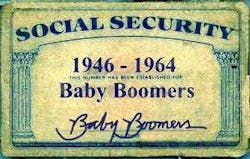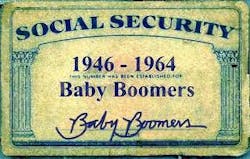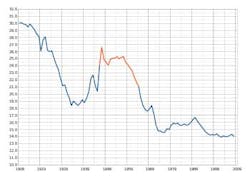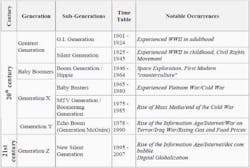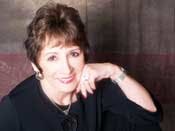The status of baby boomers' health in the United States: the healthiest generation?
From 1946 through 1964, 78 million children (“baby boomers”) were born in the United States.(1) In 2010, baby boomers made up 26.1% of the U.S. population.(1)
Medicine has improved significantly during baby boomers' lifetimes. Although these advantages have led to a progressively increasing life expectancy, previous studies have shown mixed results regarding whether baby boomers are healthier than prior generations.(2,3,4) One study examined the health status of aging baby boomers relative to the previous generation to provide a vitally important context for health workforce and policy planning in the coming years.(5)
United States birth rate (births per 1000 population). The red segment from 1946 to 1964 is the postwar baby boom. CDC(8)
As baby boomers move into their 60s and 70s, it is projected that they will utilize the healthcare system more than ever before. Doctors’ offices will be busier than ever before, and the need for healthcare professionals will rise dramatically in the next decade.
Generations Chart(9)
The baby boomer generation will be the first where the majority will maintain their natural teeth over their entire lifetime, having benefited from water fluoridation and fluoride toothpastes.(10) In a series written for National Association of Baby Boomers, Part 1 reviews factors surrounding the escalating cost of dental care and its burden on patients without dental insurance.(11) The focus of Part 2 is to provide strategies for saving money when the cost of care skyrockets.(12) Part 3 discusses dental tourism.(13)
One study compared the oral health status of adults aged 45-64 (baby boomers) and those aged 65 and older.(14) An observational, cross-sectional survey of adults living independently in rural and urban settings in Nova Scotia, Canada was conducted. Being 65 years of age or older was identified as a predictor of increased decayed, missing, filled teeth, presence of decayed and/or filled roots and presence of attachment loss ≥4 mm, but was not a significant predictor of presence of untreated coronal caries. The conclusion were that a falling rate of edentulism and a higher risk for root caries with increasing age may predict the need for more complex dental care as our population ages. Education our aging population about prevention will save pain, time, and money. As oral health care professionals, we must continue to spread the message of prevention.References 1. US Bureau of the Census. Selected characteristics of Baby Boomers 42-60 years old in 2006. http://www.census.gov/population/age/publications/files/2006babyboomers.pdf. 2. Martin LG, Freedman VA, Schoeni RF, Andreski PM. Health and functioning among baby boomers approaching 60. J Gerontol B Psychol Sci Soc Sci. 2009;64(3):369-377. 3. Rice DP, Fineman N. Economic implications of increased longevity in the United States. Annu Rev Public Health. 2004; 25:457-473. 4. Sturm R, Ringel JS, Andreyeva T. Increasing obesity rates and disability trends. Health Aff (Millwood). 2004;23(2):199-205. 5. http://trends.psc.isr.umich.edu/pdf/pubs/baby-boomer-health-united-states-2013.pdf. 6. King DE, Matheson E, Chirina S, Shankar A, and Broman-Fulks J. The Status of Baby Boomers' Health in the United States: The Healthiest Generation? JAMA Intern Med. 2013;173(5):385-386. doi:10.1001/jamainternmed.2013.2006. http://archinte.jamanetwork.com/article.aspx?articleID=1568518. 7. http://www.babyboomers.com/. 8. "Vital Statistics of the United States, 2003, Volume I, Nationality", Table 1-1 "Live births, birth rates, and fertility rates, by race: United States, 1909–2003." http://www.cdc.gov/nchs/products/vsus.htm. 9. http://www.esds1.pt/site/images/stories/isacosta/secondary_pages/10%C2%BA_block1/Generations%20Chart.pdf. 10. Oral Health for Adults, CDC. http://www.cdc.gov/oralhealth/publications/factsheets/adult.htm. 11. http://www.babyboomers.com/dentistry-the-unspoken-health-crisis-in-america/706/. 12. http://www.babyboomers.com/dental-care-america%E2%80%99s-unspoken-health-crisis-pt-2-how-baby-boomers-can-avoid-going-bust/785/. 13. http://www.babyboomers.com/dental-care-america%e2%80%99s-unspoken-health-crisis-pt-3-navigating-the-dental-tourism-jungle/829/. 14. McNally ME, Matthews DC, Clovis JB, Brillant M, Filiaggi MJ. The oral health of ageing baby boomers: a comparison of adults aged 45-64 and those 65 years and older. Gerodontology. 2012 Dec 5. doi: 10.1111/ger.12022. [Epub ahead of print].